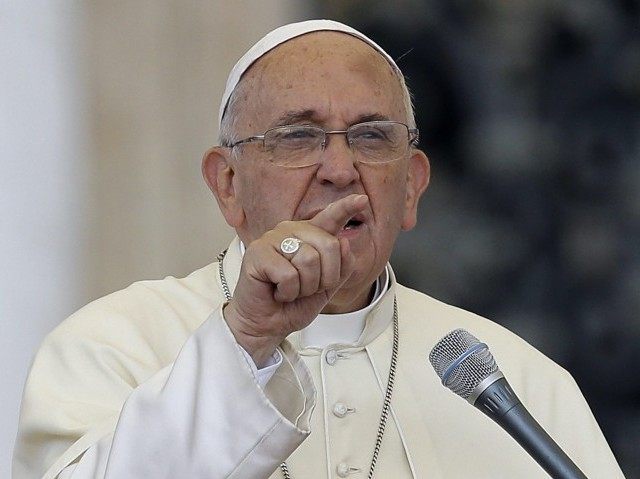Prominent Cuban-American priest, Father Alberto Cutié, questions Pope Francis’ apparently warm attitude towards the Castro dictatorship during his visit to Cuba this week, asking in a Miami Herald column, “Why do you so strongly condemn capitalism … but we never see an equally strong condemnation of atheist communism?”
Writing for the Spanish-language El Nuevo Herald, Father Cutié–a former television and radio host, who left the Catholic priesthood for the Episcopal Church to start a family in 2009–notes that while he is no longer in the Church, he feels a kinship to Pope Francis from being “part of the same labor of the Lord, with the same desire to see the Kingdom of God present ‘on earth as it is in Heaven.'” He presents his bafflement with the Pope’s visit to Cuba, in which he made only passing mentions to the rampant political oppression on the island, as three questions:
Why do you and other religion leaders condemn capitalism so strongly, and offer us a list of all the disasters that result from it on earth, but we never see an equally strong condemnation of atheist communism, which continues to cause the world so much harm? This inequality when the time comes to condemn appears unjust. […]
Why do we ignore those who suffer from the great poverty of a lack of freedom and who, only for expressing their desperation and demanding respect for the most basic human rights, are detained, harassed, and beaten? […]
Is it really more important to have diplomatic relations with a country that has not had free elections in 50 years, that abuses its people, that has a well-documented history of oppressing and robbing the Church–than to seek justice, the common good and freedom for all Cubans?
“I know,” Father Cutié concludes solemnly, “the majority of people reading this will say, ‘those Miami Cubans,’ we don’t understand. I’ve come to the conclusion that they are right. … I don’t understand–and don’t think I will ever begin to understand–why a man of God can meet with oppressors, but not the oppressed.”
In discussing the Pope’s condemnation of capitalism, Father Cutié could be referring to a number of remarks made in the past few years. In 2013, Pope Francis said that capitalism is “an economy of exclusion and inequality” and “such an economy kills.” Faced with communism–most blatantly in the form of a hammer and sickle crucifix–Pope Francis said, “I understand this work. For me it wasn’t an offense.”
Raúl Castro added to the legacy of left-wing despots giving Pope Francis questionable presents on Tuesday, offering him a large crucifix in which Jesus can be seen hanging from oars, which many interpret as either an homage to or mockery of the thousands of balseros, or rafters, who have risked and lost their lives to flee Castro and start a new life in the United States. Under Fidel Castro, it was not uncommon for the Cuban coast guard to attack the makeshift vessels Cubans used to flee; in the most prominent such case, the Cuban government intentionally drowned 37 men, women, and children attempting to flee to America.
Father Cutié joins a chorus of prominent Christians questioning the Pope’s nearness to the Castro family, and his silence in the face of abuses of prisoners of conscience. None appear more disillusioned than those persecuted by the Cuban government themselves. Members of the Ladies in White dissident group–a collective of mostly Catholic female relatives of prisoners of conscience–were placed under house arrest upon the Pope’s arrival to Cuba, despite being invited by Vatican diplomats to attend a meeting with high-ranking Catholic leaders. Dozens were arrested to prevent them from attending an open-air Mass, and those who did attend and raise the issue of political freedom were rapidly whisked away by plain-clothes Cuban government operatives.
“The Holy Father visits Cuba as a missionary of mercy, but he has not spoken about human rights … without respect for human rights, nothing the Pope urged for in his homily can be achieved,” Berta Soler, the leader of the Ladies in White group, said following her release.
In the free West, politicians like Chris Christie–whose New Jersey is home to one of the largest populations of Cuban-Americans in the country, called the Pope plainly “wrong” on Cuba in a television appearance Sunday–though, as a Catholic himself, was quick to note that the Pope was infallible (“on religious matters”). The Washington Post editorial board stopped short of calling Pope Francis a coward, writing, “A direct campaign of words and acts, like that Pope Francis is planning for the United States, would surely have an impact. But then, it takes more fortitude to challenge a dictatorship than a democracy.”
Even in the UK, The Guardian, a prominently leftwing newspaper, ran a column detailing the dismay within Cuban exile communities upon watching the Pope’s visit, noting that a Vatican spokesman “quickly walked back” the one statement the Pope made that could be interpreted as criticism.

COMMENTS
Please let us know if you're having issues with commenting.